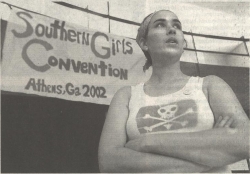As I mentioned, I spent the past weekend attenting the fourth annual
Southern Girls Convention in Athens, Georgia. About 250-300 people showed up from all over the South. I had the opportunity to attend a few really good workshops, had a really good time with friends, heard Elaine Brown and Constance Curry give great talks, saw some excellent shows, and most of all, had the invigorating experience of getting touch with hundreds of people and organizations doing social justice organizing in the South.

SGC’02 organizer Natasha Murphy, super-rad and looking a bit like Che in this photo
Before I go on, let me just say: thank you so much to Natasha, Merritt, Julie, Theo, and everyone else who drove themselves so hard to make sure that everything was set to go in Athens. Thanks also to all the wonderful women and pro-women organizers who made it all happen by organizing workshops and participating in the convention. As y’all may know, I helped organize last year’s Southern Girls Convention in Auburn. It’s been really invigorating to see the convention going on—not to mention having a chance to actually participate rather than just driving myself sleepless and staffing the registration desk!
Why am I getting so effusive? Well, simply the fact that several hundred rad people could come together and put on a pretty unapologetically anarchist / radical feminist political convention in the heart of the Deep South (Alabama and then Georgia) is inspiring and a bit humbling—and the fact that we’ve done it for four years now, going on five, is invigorating. The event has risen to the level of even getting coverage in the New York Times (!). The Times story presents a pretty positive image of the convention, but like most major media presentation, it leaves out a lot of important things about what the convention’s all about politically, and how it runs. But you have to understand all that to understand why SGC is as important and inspiring as it is. The convention is a totally grassroots, bottom-up meeting which is completely organized by local kids and run by the participants rather than any kind of self-appointed professional organizers. Workshops are based around the idea that we don’t need to import experts to tell us how to organize (from the North or from privileged sectors in our own community)—we can share our own knowledge and learn from each other. And the convention’s politics are unapologetically radical feminist, generally socialist and/or anarchist, pro-LGBT, and supportive of many other struggles for social justice. It’s not about being Scarlet O’Hara with an attitude (and let’s not even get started on the racism of that ideal…). Rather, as the Times article gets to at one point, it’s about Southern women and pro-woman activists raising hell and working to make our own communities in the South places that we want to live. And I feel really confident that we are beginning to see that happen.
What does this mean, in concrete terms, on the ground?
It means that we are working on having hard discussions about what we can do to improve our communities and our organizing efforts — such as how we can build activist communities that are more open, loving, and supportive even when we are facing emotional stress and crisis; what sort of processes we need to help prevent and respond to sexual assault in our communities; and how boys can become good allies in the work for women’s liberation. Here we got a lot of good starts but also need a lot more work. For next year, we are talking about new formats for workshops that will give people a lot more space for in-depth and focused strategizing on concrete solution—while still offering time for introductory discussion about the issue and the principles from which we want to approach it.
It also means we are doing on-the-ground organizing to roll back the power of the small Right-wing elite that has rigged the game for so long in the South through measures that directly challenge, or simply sidestep, their power plays. A perfect example is the movement to set up abortion funds to ensure low-income women’s access to reproductive choice in spite of the government’s refusal to cover this vital medical procedure under Medicaid.
It also means chances to share our skills in how-tos, whether on good vegan nutrition, political lobbying, bicycle repair, or taking control of your own body and healthcare.
And it means networking and enjoying a community with people doing work all over the South. When Southern activists are primarily used to feelings of isolation and hopelessness, the value of just seeing how many other people are working for change can’t be overstated.
Organizers have discussed all kinds of plans for how we can improve and expand the work we are doing through SGC. The always-rad Ailecia Ruscin is working on a networking project to keep Southern organizers more closely in touch with one another from day to day (if you’re interested in this project, get in touch with me and I’ll let you know more). We’re talking about organizing smaller state-level meetings to accompany the big annual meeting, allow for more discussions and much more on-the-ground organizing meetings. And new organizers are planning on putting on the next SGC in Asheville, North Carolina. Everyone is really excited about making the fifth SGC even bigger and better than before, and continuing to make SGC a transformative presence in the South for many years to come.
Women’s liberation and the rest of the struggle for social justice are not just alive and kicking in the South; the movement is on the rise and can no longer be ignored.
For further reading:



